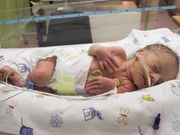Greater weight gain at day 21 in FICare group for infants born at 33 weeks’ gestation or earlier
THURSDAY, Feb. 8, 2018 (HealthDay News) — For infants born at 33 weeks’ gestation or earlier, Family Integrated Care (FICare) in neonatal intensive care units (NICUs) is associated with improved infant and parent outcomes, according to a study published online Feb. 7 in The Lancet Child & Adolescent Health.
Karel O’Brien, M.B., B.Ch., from the Sinai Health System in Toronto, and colleagues randomized 26 tertiary NICUs to provide FICare (14 sites; 895 infants) or standard care (12 sites; 891 infants). Parents in the FICare group had to commit to be present for at least six hours a day, attend educational sessions, and actively care for their infant in order to be eligible.
The researchers found that weight gain was greater in the FICare group than in the standard care group at day 21 (mean change in Z scores, 1.58 versus 1.45; P < 0.0001). In infants receiving FICare, average daily weight gain was significantly higher than that seen in those receiving standard care (mean daily weight gain, 26.7 versus 24.8 g; P < 0.0001). For infants in the FICare group, the high-frequency exclusive breastmilk feeding rate at discharge was higher than that seen in those in the standard care group (70 versus 63 percent; P = 0.016). Parents in the FICare group had lower mean stress and anxiety scores at day 21.
“FICare improved infant weight gain, decreased parent stress and anxiety, and increased high-frequency exclusive breastmilk feeding at discharge, which together suggest that FICare is an important advancement in neonatal care,” the authors write. “Further research is required to examine if these results translate into better long-term outcomes for families.”
Several authors disclosed financial ties to the pharmaceutical industry.
Copyright © 2018 HealthDay. All rights reserved.








